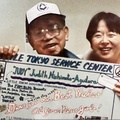Chapter 6 >>
The door opened, allowing a sliver of sunrise to temporarily blind the boy holding a gun in the corner of the Oxnard hotel room. The boy, Carlos Yamashita, squinted and aimed at the silhouette of a thin man in the doorway. Carlos was ready to shoot when the man tumbled forward and collapsed onto the frayed rug. He stayed down and a few seconds later, Carlos could hear the squeak of Bisabuelo’s wheelchair.
“Boy, put that down,” hissed Bisabuelo, quickly wheeling himself into the hotel room and closing the door. In his lap was a long bamboo stick, probably what left a bloody gash on the back of the man’s head.
“Is he dead?” Carlos asked, placing the gun next to a box of Lucky Charms cereal on the round table.
Bisabuelo leaned towards the body and put his hand down in front of the man’s nose and mouth. “Still breathing.”
“Who is he?”
Bisabuelo said nothing and gestured for Carlos to open the door that separated his room from Carlos and his father’s. He wheeled himself into the room while Carlos waited alone with the man. He studied the man’s profile—young, a colegio student, perhaps? Pale with some Asian features.
Bisabuelo returned in his wheelchair with some duct tape from the closet. “He’s one of them. The Enemy.”
Carlos furrowed his brow. The thin man didn’t seem that menacing. Something about him even reminded him of Father.
“Here, here,” Bisabuelo held out the duct tape and instructed his great-grandson to secure his hands and legs. Carlos obeyed, noticing the man’s slim wrists, dirt underneath his fingers, the wedding band on his ring finger. The man groaned a little, causing Carlos to jump back. What now?
Bisabuelo then pulled out a rope and told Carlos to tie it around the man’s middle. Together they dragged the man’s unconscious body into the darkness of Bisabuelo’s room.
***
Sayuri Shishido often forgot to charge her cell phone. The forlorn beeping and the electronic message “LOW BATTERY” were no strangers to her. And now, as she drove home from the library in Camarillo, her purse chirped sadly. She struggled to find the phone as she was stopped at the intersection but had forgotten her battery charger, anyway. What was the use?
Just another chutohampa day—a half-baked day in which Sayuri was only able to do a small portion of what she needed to get done. Libraries and books had that effect on her. She was doing research on strawberries—anything that would explain what was going on with the strawberry poisonings in North America.
She couldn’t really explain why she was so fascinated by the reports. How in the world could any of that be related to her husband’s family farm? That was crazy, just like Greg said. But there was something about Greg’s great-aunt’s Japanese textbook from the 1930s, which had the formula of a new strawberry variety written in its margins.
Different varieties of strawberries, Sayuri learned, were patented, just like mechanical inventions. There were old-time varieties—like the Banner, created in Watsonville, where Greg’s family originally farmed. The University of California even had their own unique berries—Shastas, Lassens, Donners. Private companies then got involved to patent their own berries. The competition began to produce the sweetest, sturdiest, most beautiful berry. Some companies even had investigators overseas to make sure that their patents weren’t being usurped by rogue farmers.
The formula in the Nihongo textbook was hand-written. Below it someone had written, “Poison. Death,” in kanji. Zip, one of Shishido Farms long-time workers who had studied berry propagation, didn’t know much what to make of it. Crossing and creating unique berries sometimes took decades. He had started to follow the formula, but they might not see the resulting berry for years.
Sayuri’s car remained behind the crosswalk, even after the traffic light turned green. The car in back of her honked his horn, loud and continuous. “Hai, hai,” she muttered, gazing at her rearview mirror and putting her foot on the gas pedal. She then noticed a red pickup truck in the next lane, two cars down. The driver was an Asian woman in her forties, her tanned shoulders and arms bare.
Sayuri was almost convinced that this was the same woman in a truck that had been parked on their street yesterday. Oxnard streets were full of souped up and elevated pickup trucks driven by farmers and migrant workers—but most of them were male. And the ones who were female were usually not Asian.
The truck expertly moved from one lane to another, never directly behind Sayuri’s Honda, but always a good and visible distance away. When Sayuri arrived at her and Greg’s apartment, the truck had slowed and stopped a block away. I’ll just get the license plate number and call it into the police, Sayuri decided. Once she was within the confines of the apartment, she’d be safe. Sayuri got out of the car and boldly stared at the truck’s license plate. But the driver realized what Sayuri was up to and made a sharp U-turn and left the street.
Okashii, weird, thought Sayuri, opening the door of the apartment, only to hear the phone ringing. She dropped her purse in front of the door and rushed to pick up the cordless handset.
“Have you seen Greg?” It was Bob, Greg’s father, not bothering to say hello.
“No, not since the morning.” The clock on the wall said three o’clock. “Isn’t he at work?”
“Came in before five. Got a cup of coffee but then he left. I haven’t seen him since. He hasn’t been answering his cell phone.”
A stark digital zero on the answering machine revealed that no messages had been recorded. Cradling the phone in between her chin and shoulder, Sayuri dumped the contents of her purse onto the rug. Receipts, hairbrush, lip gloss, and finally her cell phone. Sayuri plugged it into her charger, hoping to be able to quickly retrieve her messages. No voice mail messages, either.
“How about his car?” she asked.
“It’s not here.”
Where could Greg be? He was always on time, always dependable and trustworthy. For him to be missing and unaccounted for was totally unlike him.
“Well, I’m sure he’ll turn up. When he comes home—”
“I’ll call you,” assured Sayuri. They said their goodbyes and Sayuri hung up the phone.
For the next two hours in the silent apartment, Sayuri tried to keep herself busy. She made Greg’s favorite meal, chicken curry rice, and waited. But the curry just sat cold on a stove burner and the minutes passed away. Taped on the kitchen wall was a map of North America, and bits of news releases about the strawberry poisonings in Canada. Sayuri referred to it as her “crime scene” wall, reminiscent of police television shows. Up to this day, her crime scene wall had captivated Sayuri’s attention, causing a rift between her and her husband, who just watched on the sidelines like a traffic accident lookie-loo. Tonight, however, the wall held no interest for Sayuri. In fact, all the images seemed to make her more tired.
At seven, Sayuri called the home of her parents-in-law.
Alex, her mother-in-law, answered on the first ring. “Hello.”
“Mrs. Shishido, it’s me, Sayuri.” Even though they had been married for more than a year, Sayuri still couldn’t call her mother-in-law by her first name. “Have you heard anything?”
“No. Not you, either?”
“No.”
The two women then said nothing for a moment. They both knew what each other was thinking. For Greg to be MIA for twelve hours meant something was wrong, terribly wrong.
“Is Mr. Shishido there?”
“Bob went out.”
“Oh.” Once Mr. Shishido came home, he usually stayed home. He was a recliner man, who spent his evenings in front of their large-screen television. He only left his house for strawberry association meetings or funerals. Has he gone to check the hospitals? Sayuri wanted to ask. But she didn’t. Because she knew that he was probably making the rounds. Bob was a person of action, much like herself.
“Has everything been all right, Sayuri?”
“What do you mean?”
Alex was a typical American woman—straight-forward and always to the point. For her to be so round-about, almost Japanese, was unusual. “Bob has mentioned that Greg has seemed distracted at work. I just wondered if everything was okay with you two?”
Sayuri blushed and was thankful that she was by herself in the apartment. “Everything is fine. Has been fine.”
“I didn’t mean to suggest anything—”
Sayuri cut the conversation short without even saying goodbye properly. Things had actually not been fine between her and Greg. She shouldn’t have made such a big deal about the strawberry poisonings, the Shishido family history. Still waiting for her green card, she had too much time on her hands. “Aho,” Sayuri chided herself. I’m such a fool. She got the step ladder leaning against the refrigerator and unfolded it in front of her crime scene collage. She carefully removed all the taped papers until the wall was completely bare, a rectangle of pristine white.
***
After stripping the apartment from any signs of her strawberry research, Sayuri took Greg’s extra office key and drove to the bungalows on the farm. Farming was an early morning business—all the forklifts and trucks were parked and empty.
Sayuri entered the bungalow and snapped on the light. Surely there had to be some sign of where Greg was. She knew what her mother back in Japan would say—another woman, had to be. Sayuri hadn’t kept up with her appearance, had let her hair grow shaggy and long. In fact, wasn’t there a spray of adult acne on her forehead? Sayuri shook those fears from her mind. Greg was a perfectionist and sometimes intolerant. But not a philanderer. That wasn’t part of his makeup.
His desk, as usual, was pristine. His in-and-out basket only contained stacks of strawberry order forms. His calendar revealed different appointments written out in his neat block lettering. There was nothing in the square for today. Next to Greg’s desk was a small table for the coffee maker. Greg was addicted to coffee and had many mugfuls a day. He insisted on spending extra money for Starbucks’ beans. Told Bob that it would be worth it because he’d be more productive. Mugs bearing the name of Shishido Farms and a giant red strawberry design lay stacked beside the coffeemaker for special guests and vendors. Sayuri told him to let the secretary handle coffee duties, but Greg said that he didn’t mind washing the mugs at the end of work. Said that it relaxed him, in fact.
As she sat in her husband’s chair, his phone rang. Sayuri hesitated for a moment—it probably was just a strawberry order—but then answered.
“Hello.”
“Who’s this?”
“Ah—”
“Sayuri, is that you?”
Sayuri recognized the deep and reassuring voice of Zip.
“What are you doing there?”
“Well, just checking if Greg—”
“Still hasn’t turned up?”
“No.”
“Man, he’s been acting so strange lately.”
“What do you mean?”
“Well, just yesterday, he was all excited about our new hire.”
“Who’s that?” Sayuri didn’t remember Greg mentioning a new person on the farm.
“This Jorge Yamashita. Brilliant guy. Knows all about strawberries and hybridizing. Just came over from Paraguay. For some reason, Greg is obsessed with the guy. Thinks that there’s something suspicious about him. Found out that he’s living in a motel by the freeway. I told him that a lot of people are living in motels these days.”
***
Sayuri drove into the motel parking lot and searched for Greg’s truck. There were rows of large pickup trucks but none of them were Greg’s. In her hand was a Post-It note with the motel address and room number “202.” Upstairs.
The motel was one of those typical L-shaped rectangular buildings with wrought-iron gates and railings. It was a little fancier than a Motel 6 because there was an escalator by the motel office. Sayuri chose to take the stairs.
She passed rows of rooms and windows, heavy curtains drawn but edges of light peeking out. Different television programs hummed from various rooms. Sports, fake laugh tracks, explosions—all masking what might actually be happening behind closed doors.
Room 202 was in the corner, away from the office and traffic. Like the other rooms, the curtains were closed but the light was on. Cartoon voices emanated from within.
Sayuri knocked on the door. No answer. She knocked again, louder.
“Mr. Yamashita—I need to talk to you.”
The television volume was turned down. Then the door shook for a moment as locks were unlocked. Finally, the door creaked open to reveal an Asian man about fifty in age. He had a heavy mustache and wore a flannel shirt, obviously just thrown on, and jeans. His eyes were brown and bloodshot, but still gentle, somehow.
“Yes.”
“Hello. I’m Sayuri. You know my husband, Greg Shishido.”
Jorge frowned a little, not seemingly from displeasure but confusion. “Come in,” he said.
Sayuri knew that it was foolish for her to step into a strange man’s motel room, but she wondered why this man had commanded the intense scrutiny of her husband.
Seated on one of two king beds was a boy in Hot Wheels pajamas, holding a bowl of cereal.
Was the boy living there with his father? Sayuri had heard of families, struggling in this economic climate, who had to turned to cheap motels for housing.
“This is my son, Carlos.”
“Hello, Carlos. I’m Sayuri.”
“Sayuri.” The boy’s face lit up. “Nihonjin?”
“Yes, I’m from Japan.”
Before she knew it the boy had jumped off his bed and taken a manga from his backpack. He obviously wanted her to explain some of the story, but his father put a stop to it and told him to return to his bed. Jorge then pulled out a chair and offered it to Sayuri.
“How can I help you?” Jorge switched over to Japanese and Sayuri was impressed that someone from Paraguay could speak the language so well. Both Bob and Greg’s Japanese were pretty miserable.
“Well, I don’t know if you knew, but my husband is missing.”
“I saw him this morning.”
“Well, he did go into work, but he hasn’t been seen since about five o’clock in the morning.”
Jorge frowned again. This time he looked genuinely concerned. “Soka. That’s strange. Doesn’t seem like him.”
No, Sayuri agreed. They spoke some more and Sayuri learned that the Nikkei in Paraguay had a good Japanese-language program and even some Nisei and Sansei there could speak Japanese with ease.
As she perused one of Carlos’ Japanese-language books, there was an audible thump next door. It seemed to alarm the young boy, as he spilled his cereal onto the carpet.
“Carlos—”
The boy dutifully went to the sink to get a hand towel to clean up his mess.
“The neighbors are very loud,” Jorge explained.
“Yes, I can imagine hotel-living is very rough.”
They both said nothing for a while and then Sayuri rose from her chair.
“Well, I better go,” she said. Just a working-class man with his son, trying to make ends meet. They couldn’t be involved with Greg’s disappearance.
She said goodbye to the man and his son. As she passed the neighboring room, she thought that she saw the curtains behind the window move. What a strange neighbor, Sayuri thought, thankful for the first time for her and Greg’s small apartment.
As she walked down the stairs, she scanned the parking lot again. No sign of Greg’s truck. This had been a dead end. She wondered if Bob, on his search, had discovered anything new.
Crossing the parking lot for her car, Sayuri stepped on something. When she looked down, it was a piece of broken china. It looked familiar. She leaned down and gingerly picked it up with the tips of her fingernails. On the piece of ceramic was the familiar design of a red strawberry and the letters, SHI.
* “The Nihongo Papers” is a work of fiction. The characters, incidents, and dialogue are drawn from the author’s imagination and are not to be construed as real. Any resemblance to actual events or persons, living or dead, is entirely coincidental.
© 2008 Naomi Hirahara





